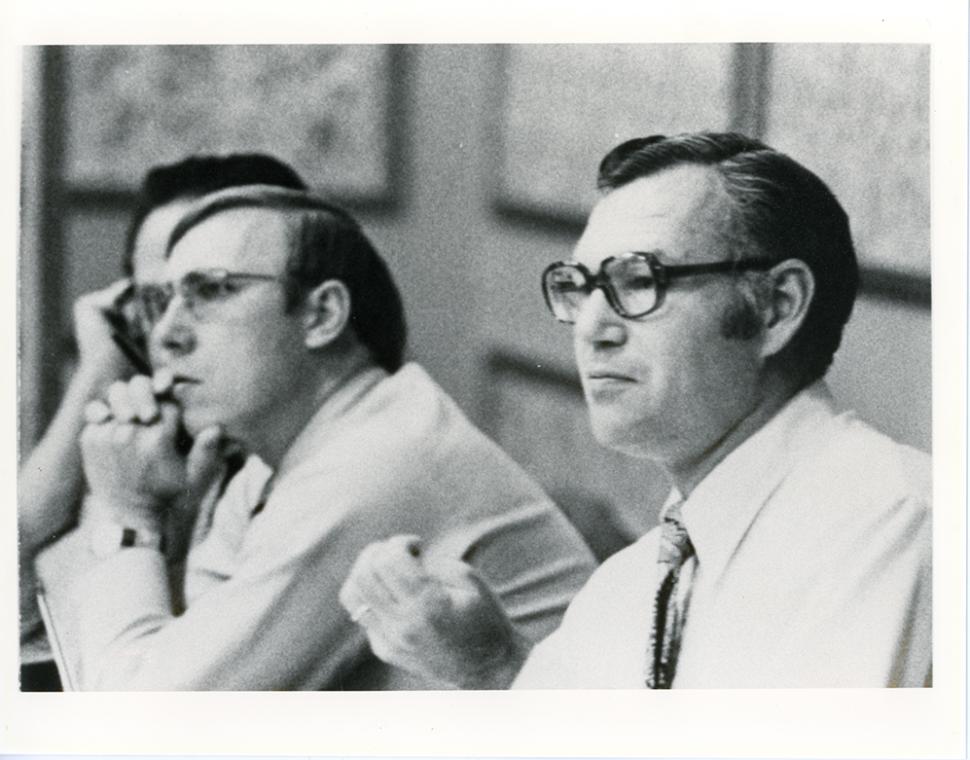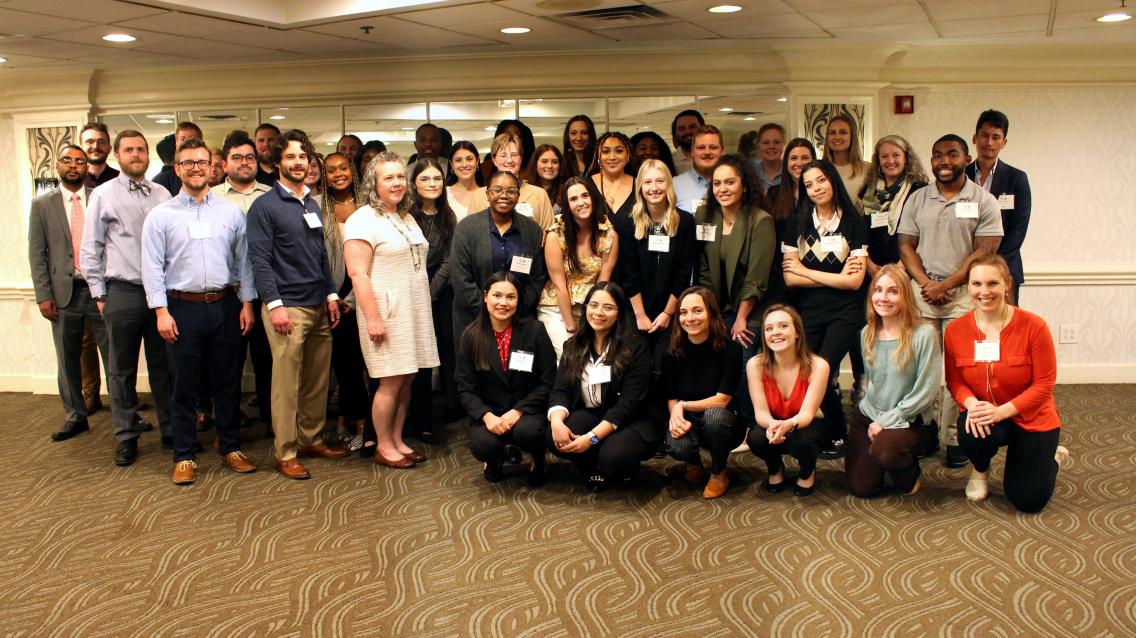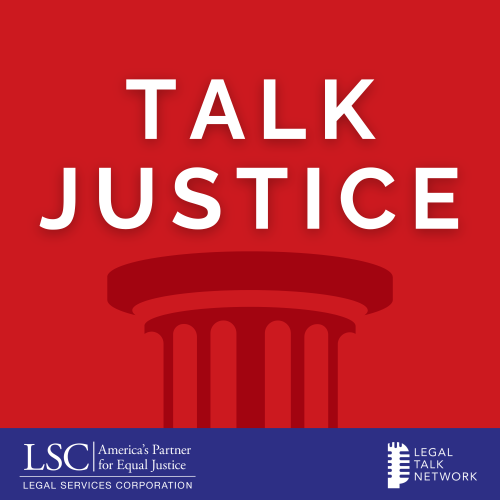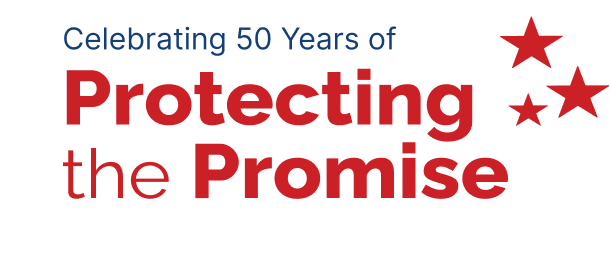50th Annual Report
For 50 years, the Legal Services Corporation (LSC) has been protecting the promise of equal justice for all by providing millions of Americans with access to life-changing legal assistance.
Americans helped with their civil legal problems
dollars invested directly in communities in every state and territory
serving every congressional district in the U.S.
Protecting the Promise
To commemorate LSC's 50th anniversary in 2024, LSC reaffirmed our mission by reaching out to communities across the country, demonstrating the impact of LSC's work for hardworking Americans who would otherwise face the legal system alone — a complex system built by lawyers, for lawyers.
LSC grantees help everyday Americans solve problems they face through no fault of their own.
Upholding the Promise
"It is easy to take this network for granted, but it is a major civic achievement and forms the backbone of America’s civil legal services system."
From Promise to Progress

Roger Cramton and Glenn Stophel at LSC Board Meeting (c. 1978)
LSC was established by Congress in 1974 with a bipartisan commitment to promoting equal access to justice. Since then, our mission has been to ensure that everyday Americans receive high-quality civil legal assistance, helping them overcome legal challenges that threaten their homes, families and financial security.
A Promise in Action
Throughout the year, LSC spotlighted the growing need for civil legal services by convening leaders across sectors and hosting events nationwide.
Leaders Council and Emerging Leaders Council

Kenneth Frazier
Chairman of Health Assurance Initiatives, General Catalyst

Harriet Miers
Partner at Troutman Pepper Locke and former White House Counsel
LSC’s Leaders Council (LC) and Emerging Leaders Council (ELC) bring together experts from diverse industries across the country. Members amplify LSC’s mission by championing the importance of civil legal services through speaking engagements, articles and other strategic outreach efforts that elevate awareness of LSC’s work.
Members played a central role in LSC’s 50th anniversary celebration, with several serving as co-chairs of the milestone event.
Throughout the year, members served as prominent speakers and panelists at LSC events. Notably, Texas Chief Justice Nathan L Hecht, a member of the LC, testified on the importance of closing the justice gap before the Senate Judiciary Committee in July.
Learn more about their workStrengthening the Promise
LSC Research Sheds Light on Public Perception of Civil Legal Help
LSC's 2022 Justice Gap report revealed that low-income Americans receive no or insufficient legal help for 92% of their serious civil problems. In 2024, LSC commissioned a national Harris Poll to probe public understanding of the crisis.
More than half of respondents mistakenly believed they are entitled to a free lawyer in any civil matter, underscoring the urgency of closing the gap.
The poll also showed that 59% of people who experienced a civil legal matter within the past three years did not seek out legal helpfrom an attorney who could have been pivotal in getting their issues resolved.
Findings from the poll now inform survey design and stakeholder outreach for LSC's 2027 Justice Gap Study, which will provide the most comprehensive look yet at unmet need—and the resources required to meet it.
82% of older Americans
Victims of scams or identity theft
63% of people contacted
by creditors or collection agencies
52% of natural disaster survivors

Data That Makes a Difference: Eviction Research and Civil Court Data Initiative
As part of a multi-year comprehensive study, LSC released additional findings from its Eviction Study in 2024. The research documented how state and local laws impact tenants and landlords. The findings underscore the critical importance of partnerships between legal aid providers, community organizations and landlords in preventing unnecessary evictions and promoting housing stability.
This work helped drive the expansion of LSC's Civil Court Data Initiative, now the nation's largest and most comprehensive civil court dataset. CCDI aggregates filings from more than 1,290 counties across 31 states and territories, providing legal aid organizations, researchers and policymakers with timely, standardized data on eviction, debt collection, guardianship and other key issues. By supporting local reform efforts and enhancing service delivery, CCDI is transforming how legal aig providers target outreach, develop interventions, and measure impact.
Expanding Access, One Rural Community at a Time

Rural communities across the country face persistent barriers to legal help, from attorney shortages to geographic isolation. To address these challenges, LSC and Equal Justice Works launched the Rural Summer Legal Corps (RSLC) in 2016.
Each summer, RSLC places law students with LSC-funded legal aid organizations serving rural and remote areas. Over the course of eight to 10 weeks, fellows direct legal assistance, support community outreach and education, and help strengthen the capacity of their host organizations.
In 2024, 50 RSLC Fellows from 35 law schools served at 44 LSC-funded organizations across the U.S. and its territories, expanding access to justice in communities where legal resources are often scarce.
Learn more about RSLCTalk Justice: A National Conversation on Civil Legal Services
LSC's Talk Justice podcast brings together voices from the legal, technology and business communities to explore the evolving landscape of access to justice. With thoughtful conversations and expert insights, the podcast reaches new audiences and highlights the critical role of civil legal sevices in people's lives.
In 2024, Talk Justice tackled timely and complex issues — from the ethics of articial intelligence to the rising tide of medical debt lawsuits and the role of community justice workers in expanding access. Guests included members of Congress, judges, legal aid leaders, business executives and technologists.
Talk Justice is produced twice a month with support from LSC's Leaders Council, and is available on Apple Podcasts, Spotify and other major platforms.
Top Episodes of 2024
Justice in the Aftermath: Supporting Disaster Survivors
Natural disasters leave more than physical destruction — they create lasting civil legal challenges. Survivors often face urgent needs like replacing identification, securing benefits, handling insurance disputes and maintaining housing stability.
LSC's Midwest Legal Disaster Coordination Project IV builds a coordinated, regional response to ensure that legal aid is part of the recovery process. In 2024, the project expanded into additional states, strengthened collaboration among legal services providers and developed tools to support rapid response and disaster readiness across the Midwest.
This work is supported by a private Midwest-based funder who has partnered with LSC on disaster legal services since 2014, helping ensure that survivors get the support they need to rebuild their lives.
Focused Solutions for Urgent Legal Needs: LSC Task Forces
LSC's privately funded task forces bring together legal aid leaders, subject-matter experts and community partners to address some of the most urgent and persistent barriers to justice. In 2024, three active task forces advanced key efforts to strengthen civil legal services for vulnerable communities.

The ongoing opioid epidemic continues to create civil legal challenges, including securing benefits, finding stable housing, resolving child custody issues and accessing health care. In 2024, the Opioid Task Force released a 10-part online training module to help legal aid providers better support clients with substance use disorders.
Learn more
Access to legal help remains especially scarce in rural and remote communities. The Rural Justice Task Force, launched in 2021, continued work on its final report — slated for publication in 2025.
Learn more
Veterans often face overlapping civil legal challenges related to housing, benefits, estate planning and health care. In 2024, the Veterans Task Force partnered with LSC grantees in Arkansas to host a legal clinic serving more than 115 veterans from Arkansas, Missouri and Oklahoma.
Learn moreFulfilling the Promise with Integrity and Oversight
Effective stewardship is essential to fulfilling LSC's mission of advancing access to justice. LSC works to maximize the availability, quality and effectiveness of civil legal services by working with grantees to strengthen their organizational and operational capacity.
LSC grantees are subject to statutory and regulatory restrictions enacted by Congress that limit certain activities and client representations. Throughout 2024, staff responsible for grantee oversight upheld rigorous standards to support accountability and program integrity.
Compliance and Enforcement
The Office of Compliance and Enforcement (OCE) ensures grantees follow the LSC Act, regulations and funding restrictions. OCE had a highly active year, conducting a wide range of oversight and support activities to strengthen grantee compliance and capacity.
Altogether, these efforts reached grantees in 22 jurisdictions, demonstrating OCE's broad impact.
Program Performance
LSC's Office of Program Performance (OPP) provides grantees with comprehensive support, focusing on program assessment visits, technical assistance and other targeted initiatives to strengthen grantee operations and capacity. OPP also regularly promotes best practices to provide high-quality civil legal services and promote innovation.
In 2024, OPP conducted 29 visits to grantees in 18 states, helping ensure grantees were effectively meeting client needs.
Training and Technical Assistance
LSC's Office of Training and Technical Assistance (OTTA) further supports LSC grantees by offering essential training. OTTA's Learning Management System provides grantees with curated and custom-designed content to improve their services. LSC's Model Practices and Innovations page offers valuable resources on providing and managing legal services, legal aid technology and strategic planning.
Financials
We are committed to fiscal responsibility, transparency and oversight in managing federal funds. LSC ensures taxpayer dollars are used efficiently and effectively to provide essential legal aid services to American families, workers and veterans in need.


